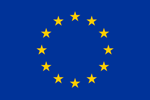Concept
Over the past three decades, phytoremediation has been considered a less expensive and environmentally friendly remediation technology than traditional physicochemical methods. In EiCLaR, different plant species are being used. They exhibit high biomass yields, fast growth rates and abilities to grow in nutrient-poor soils and to biodegrade a wide range of organics, including persistent organic pollutants (POPs).
Background and benefits
Focus was often put on the phytoextraction of metals, which is relatively slow and incomplete and generates problematic biomass in many regulatory jurisdictions. A more successful approach has been exploiting the synergistic interactions between plants, microorganisms and/or mycorrhizae to degrade or immobilise contaminants in situ completely. EiCLaR develops a technology using electrodes and applying electricity. Both corrode iron and drive newly formed iron oxides, which can assist in the immobilisation of metals in deeper soil layers and degrade organic contaminants. Mycorrhizal inoculum injection increases the synergistic interactions between plants, microorganisms and mycorrhizae to degrade or immobilise contaminants in topsoil.
Partners






